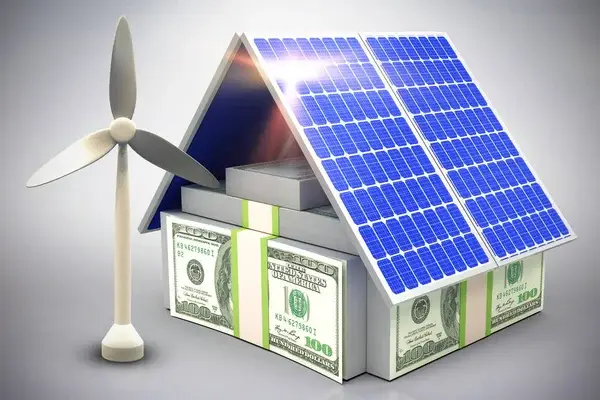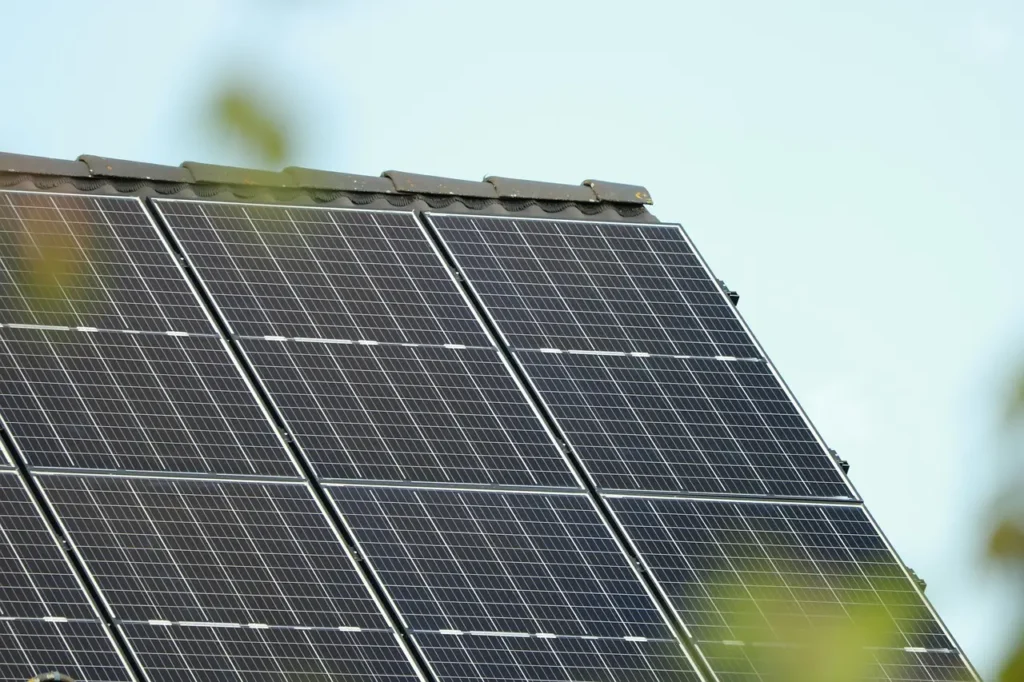Solar Financing Options: Empowering Ghanaians in the UK
Solar Financing Options: Empowering Ghanaians in the UK – Explore flexible and affordable solar financing solutions designed to help Ghanaians in the UK invest in clean, renewable energy for their homes and businesses. Have you ever thought about how you can make a difference back home while living in the UK? If you’re a Ghanaian in the UK, sending solar systems to your family in Ghana could be a meaningful way to contribute.
Not only can it help them save on energy costs, but it also promotes sustainability. But how can you make this dream a reality without breaking the bank? That’s where solar financing options come in. You’ll discover simple and effective financing solutions designed just for you.

These options can turn your aspirations into achievable goals, empowering you to support your loved ones while also making a positive impact on the environment. Keep reading to learn how you can illuminate lives back home with ease and efficiency.
Solar Energy Benefits
Solar energy offers numerous benefits for Ghanaians in the UK, including sending systems home. It provides a sustainable way to power homes and businesses. Many are considering solar financing options. This is due to the increasing awareness of its advantages. Solar energy not only supports the environment but also boosts economic savings. Let’s explore these benefits.
Environmental Advantages
Solar energy is a clean power source. It reduces carbon emissions significantly. Using solar panels means less reliance on fossil fuels. Fossil fuels contribute to air pollution. Solar power helps preserve natural resources. It also decreases greenhouse gas emissions. This makes it an eco-friendly option. Supporting solar energy supports a healthier planet.
Economic Impact
Solar energy can lower electricity bills. Once installed, solar panels generate free power. This reduces monthly utility costs. The initial investment pays off over time. Solar systems increase property value. Homes with solar panels attract buyers. They see long-term savings as an advantage. Solar energy also creates job opportunities. The industry needs skilled workers for installation and maintenance. This boosts local economies. Investing in solar energy is a smart financial move.
Challenges For Ghanaians In The UK
Ghanaians in the UK face hurdles in finding solar financing options for sending systems home. Navigating complex financial terms and different payment plans can be challenging. Understanding these options is crucial for sustainable energy solutions in Ghana.
Challenges for Ghanaians in the UK: Navigating the world of solar financing can be a daunting task, especially for Ghanaians living in the UK who wish to send solar systems back home. The unique challenges faced by this community can make the process seem overwhelming. However, understanding these obstacles is the first step towards overcoming them.
Financial Barriers
One of the significant hurdles is the financial barrier. Many Ghanaians in the UK work hard to save money, yet the upfront costs of solar systems can be prohibitive. Imagine wanting to provide your family with a reliable power source, only to find the initial investment out of reach. Have you considered how long it might take to save enough? High costs can discourage you from pursuing solar energy solutions, despite the long-term savings.
Awareness And Accessibility
Another challenge is the lack of awareness and accessibility to financing options. Many Ghanaians may not know the diverse range of financing schemes available to them. This lack of information can lead to missed opportunities. Have you ever felt lost in a sea of financial jargon? Accessibility is also an issue, as some financing options may not be readily available to those living abroad.
Consider how much easier things would be if there were clear, accessible information tailored to your needs. You could make informed decisions and tap into resources designed to support your goals. Addressing these challenges requires both awareness and action. By becoming informed and seeking out the right resources, you can overcome these obstacles and successfully send solar systems home.
Available Solar Financing Options
Embracing solar energy is a commendable step towards a sustainable future, especially for Ghanaians living in the UK who wish to send solar systems back home. Financing these systems can be a major concern, but there are several options available to make it easier. This guide will walk you through some of these options, giving you a clearer path to achieving your solar ambitions.
Private Loan Opportunities
Private financial institutions offer loans specifically tailored for renewable energy projects. These loans can be a feasible option if you need upfront capital to purchase solar panels and related equipment.
Interest rates and terms can vary significantly, so shop around for the best deal. Reach out to banks or financial advisors who specialize in eco-friendly initiatives to guide you through the process.
Community Solar Programs
Community solar programs offer a chance to invest in solar energy without installing panels on your property. These programs allow you to purchase or lease a share of a community solar project and benefit from the energy it produces.
Participating in such a program can be a smart way to support solar energy while reducing your own electricity costs. Could this be the stepping stone you need to fund a solar project back home?
Each of these options has its unique advantages and considerations. Which one aligns with your financial situation and goals? Reflect on how these choices can not only benefit you but also create a positive impact in Ghana.
Choosing The Right Financing Option
Choosing the right financing option is crucial when you’re looking to bring solar power systems home to Ghana from the UK. With various options available, picking the right one can make a significant difference in your investment’s success and sustainability. Let’s delve into some practical aspects you need to consider before making a decision.
Assessing Personal Financial Situation
Start by understanding your own financial situation. Are you in a position to pay upfront or do you need a loan? Look at your savings and monthly income. This will help you determine how much you can comfortably allocate towards solar financing.
Consider any existing debts or financial commitments. You don’t want to stretch your finances too thin. A friend of mine once took a loan for solar panels without checking his other obligations, and it turned out to be financially stressful. Learn from his experience.
Think about your financial goals. Are you looking for a short-term solution or a long-term investment? Your goals will guide you in choosing the most suitable financing option.
Evaluating Long-term Benefits
Ask yourself: What are the long-term benefits of investing in solar energy? It’s not just about the immediate savings on electricity bills. Solar panels can increase the value of your property and offer environmental benefits.
Think about the maintenance costs. A financing option that seems cheap now could be expensive in the long run if it doesn’t cover maintenance. Compare different plans and opt for one that offers the best long-term value.
Consider the reliability of the financing provider. A reputable provider will offer transparent terms and good customer service. You want to ensure that they will be there to support you throughout the loan period.
Choosing the right financing option requires careful thought and planning. By assessing your financial situation and evaluating long-term benefits, you can make a decision that aligns with your goals and offers peace of mind. What steps will you take to ensure your solar financing choice is the right one for you?
Success Stories
Solar financing options have created positive changes for Ghanaians in the UK. Sending solar systems back home has led to many success stories. These stories show the benefits of using solar power in Ghana. Ghanaians are supporting their families and communities effectively. They are making significant impacts through solar energy solutions.

Case Studies Of Ghanaians Benefiting
Kwame, a Ghanaian living in London, invested in solar panels for his family. His parents in Ghana now enjoy consistent electricity. The move reduced their monthly electricity bills. It also provided a reliable power source for their small business. Another Ghanaian, Ama, sent solar systems to her hometown. Her efforts brought electricity to a local school. The students now study comfortably in the evenings.
Impact On Communities
Solar systems have created a ripple effect in communities. In Kwame’s village, others followed his lead. More families installed solar panels, reducing their dependency on erratic power. This shift boosted local businesses and improved living standards. Ama’s school initiative inspired other community projects. Villagers began using solar-powered water pumps. These pumps improved access to clean water significantly. These success stories highlight the power of solar energy. They demonstrate its potential to transform lives in Ghana.
Future Prospects
Imagine a future where you can power your home in Ghana with solar energy efficiently and affordably. As you consider solar financing options, it’s crucial to think about the future prospects that could influence your decision. These prospects revolve around technological advancements and policy developments, both of which are key to maximizing your investment in solar energy.
Technological Advancements
Solar technology is evolving rapidly. New innovations promise better efficiency and lower costs. In the UK, researchers are developing solar panels that capture more sunlight and convert it into energy efficiently. This means you could send more power home with fewer panels.
Battery technology is another area to watch. Imagine having a battery that stores energy for rainy days or night use. This technology is becoming more affordable and reliable. Investing in such advancements could make solar power a practical choice for your home in Ghana.
Policy Developments
In the UK, policies are increasingly supporting solar initiatives. These policies might influence the financing options available to you, making solar energy more accessible.
In Ghana, look out for supportive policies that might emerge. How would these policies impact your solar investment? Staying informed can help you make better financial decisions.
Thinking about future prospects may seem daunting, but it’s necessary. Consider how technological advancements and policy developments could shape your solar financing options. They could make the difference between a good investment and a great one.
Frequently Asked Questions
What Are the Solar Financing Options in the UK?
Ghanaians in the UK can explore various financing options. These include personal loans, green energy loans, and solar-specific financing. Banks and credit unions offer competitive rates. Many solar companies also provide in-house financing. Research each option to find the best fit for your needs.
How Do I Send Solar Systems To Ghana?
To send solar systems to Ghana, consider using reliable shipping companies. Compare shipping costs and delivery times. Ensure that the equipment is well-packaged to prevent damage. Check for any import regulations or duties in Ghana. It’s advisable to insure your shipment for added security.
Are There Grants for Solar Energy in the UK?
Yes, there are grants available for solar energy in the UK. The UK government and local councils offer schemes to support renewable energy adoption. Check eligibility criteria before applying. These grants can significantly reduce installation costs, making solar energy more accessible and affordable.
What Are The Benefits Of Solar Energy For Ghanaians?
Solar energy provides clean, renewable power, reducing reliance on fossil fuels. It offers significant cost savings on electricity bills. For Ghanaians, it ensures energy independence and reliability. Solar systems can operate in areas with limited grid access, enhancing energy security and supporting sustainable development in Ghana.
Conclusion
Exploring solar financing options offers hope for Ghanaians in the UK. Sending solar systems home becomes more feasible with good planning. Affordable solutions empower families to embrace green energy. Consider savings and long-term benefits when making choices. Every step towards solar energy contributes to a sustainable future.
It also supports loved ones back home. Choosing the right financing can make solar dreams come true. Energy independence and lower costs are achievable goals. Solar power is a wise investment for brighter days ahead. Helping the environment and home country at the same time.
